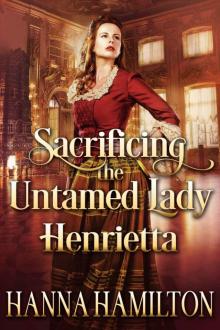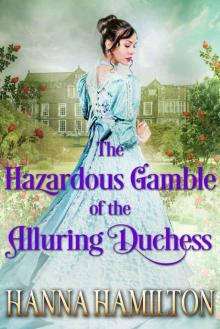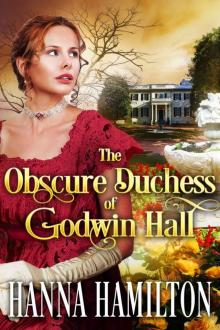- Home
- Hamilton, Hanna
The Obscure Duchess of Godwin Hall: A Historical Regency Romance Novel Page 3
The Obscure Duchess of Godwin Hall: A Historical Regency Romance Novel Read online
Page 3
Rebecca held out her hand to Caroline, feeling glad that she could rely on their friendship even in times like this when she felt there was nothing else in the world within her control.
“For what it is worth,” Caroline said, putting her hand out to Rebecca in a gesture of solidarity. “I also wish that it had been Andrew who was chosen as your husband.”
Chapter 4
The Earl of Sheffield sat alone in his library, a small glass of sherry on the desk next to the letter that he had not yet decided how best to answer. The fire crackling in the background punctuated his thoughts.
“She has always been a difficult one,” he said aloud to the portrait of his late wife hanging in pride of place on the opposite wall. “Always so headstrong. Perhaps I should not be surprised that she has responded in this way.”
The portrait looked back at him with the same piercing green eyes now belonging to his daughter.
He sighed and looked down at the opened letter, reading it once again, although he knew that there was no new information to be gleaned from the contents.
My Lord,
It falls to me to formally convey to you the sad tidings of my father’s death. My late father was a most excellent man, and I hope that you will join me in praying for the safe delivery of his soul.
You will know by now that this news first reached your household by means of a letter from my brother to your daughter. I beg your pardon for any impropriety on my brother’s part; no slight was intended on Lady Rebecca’s honor.
This brings me to the matter of mine and Lady Rebecca’s imminent marriage. Although I was made aware of the arrangements for our betrothal on the occasion of my one-and-twentieth birthday and greeted them with all the joy and anticipation that might be expected for such a prospect, I believe that Lady Rebecca has not yet been informed that she and I are intended for one another.
I believe that my late father would have wished for me to undertake the office of matrimony as swiftly as possible on my assumption of his title, and therefore ask that you inform Lady Rebecca of our future joy at the earliest available opportunity.
You will, of course, be aware that it is not customary for such occasions as weddings to take place within the mourning period unless they are already long-standing arrangements. I believe that since the matter of my marriage to Lady Rebecca has long been decided upon, this occasion falls into the latter category. I believe that my father would not wish there to be any delay in the completion of my happiness, and therefore propose that the wedding take place in two weeks’ time, with your blessing.
I remain your devoted Servant,
Charles Godwin
The Earl of Sheffield sighed and folded the letter again. Considering how strongly his daughter had reacted to the news of her betrothal, it seemed unlikely that she would take any better to the idea of becoming the Duchess of Leinster in only a fortnight. And perhaps it would be wise to give her a little more time to get used to the idea.
The Earl earnestly wished above all else that his daughter would be happy. He had seen the misery of occupying a precarious position in society, as Caroline Swanson did, and had no wish to see the same inflicted on his only child. Clearly, Rebecca did not see the matter in the same light, but he hoped that she would come around in time.
Perhaps, he mused, there was no sense in dragging out the anticipation of the wedding longer than was necessary. After all, the contract was signed and had been since the new Duke’s one-and-twentieth birthday. His father had wanted the whole thing settled ‘before I leave this earth,’ and it turned out that he had been quite right to get their agreement in writing so early on.
It was the Earl himself who had suggested that they wait a little longer before the engagement be turned into a marriage.
The truth was that he had wanted to keep Rebecca to himself for as long as possible. Since her mother had died when she was only five years old, it had been just the two of them together, although he had had an attack of conscience over her wellbeing when she was fifteen, and taken on Miss Swanson as a companion for his daughter.
Miss Swanson had been introduced to the family as the ward of the Earl’s brother who had taken very little interest in his young charge. There was some question that the girl was his natural daughter, but if that was the case, it did nobody any good to dwell upon the matter.
What was known beyond doubt, however, was that the girls were devoted to each other, and so in a fit of kindliness, he had taken over responsibility for Miss Swanson’s keep — much to his daughter’s delight.
But perhaps, he mused now, he had been selfish all this time. His daughter was twenty now, and he could not continue his protestations that Rebecca was too young to marry any longer.
The sooner his daughter had assumed the title of Duchess, the sooner she could begin to accustom herself to the pleasures of her new life. He was sure that the new Duke would make a perfectly reasonable husband, if not the dazzling one that flighty young women might have hoped for.
He dipped his pen into the inkwell and began to write his response to the Duke.
Chapter 5
Andrew could stay inside the house no longer.
It had been intolerable enough since Charles had returned from his travels, apparently sorrowful over the death of their father but doing very little to disguise his jubilance at the prospect of his imminent marriage.
And why should he not be jubilant? Andrew thought. Would he himself not have reacted in precisely the same way if he had become engaged to Rebecca Winterson - Becca, as he had always thought of her since they had been inseparable childhood playmates.
The conversation that he’d had with Grandmamma Horatia had made him feel even worse in many ways, but at least it had persuaded him to cease in his pretenses, at least to himself.
The fact of the matter was that both he and Charles had been in love with Rebecca for as long as either of them could remember.
At first, it had been the innocent fascination of childhood, but the attachment on Andrew’s part had matured into something far deeper as they had both grown up, and had been cemented on the occasion of Rebecca’s coming-out.
He remembered vividly the moment he had seen her being presented at court, not long after her seventeenth birthday. Perhaps that had been the first moment he had realized his feelings for her were far from brotherly in nature, though he had done his best to deceive himself in that matter for the last four years.
He had pretended that they could carry on in the same way that they always had, affectionate and free with one another in a way that would rarely have been permitted between a young man and a young woman.
He saw now that the reason they had been allowed to remain intimate friends was there was never any danger of anything coming of it. When they had turned one and twenty, their father had informed them of Charles’ betrothal to Rebecca.
The thought of it had made Andrew feel wretched, yet he had always managed to pretend to himself that the engagement would somehow never be fulfilled, that Charles would meet another young woman and find a way of breaking off the engagement before Rebecca was ever told about it, so that they might both have their freedom and save face.
The foolishness of that belief was harshly highlighted now by the sight of the carriage coming up the drive of Godwin Hall.
He could barely bring himself to look at the carriage, knowing that it contained Rebecca, knowing that he would have to watch his brother greeting her as a fiancée, knowing that he himself would have to spend the rest of his life treating the woman he loved with the friendly distance of a brother-in-law.
“My horse,” he snapped to the groom who was standing a few feet away from him. “Straight away.”
Chapter 6
The plans to make the journey to London for the season were on hold.
Instead, the party of Rebecca, her father, and Caroline, whom she suspected her father had enlisted for the purposes of moral support, were to make the five-and-twenty-mil
e journey to Godwin Hall. As far as Rebecca knew it was purely so that she and Charles might spend some time together so that she could become better acquainted with the idea of their marriage.
Rebecca could not fathom why since it seemed to her that she could just as well spend time with her betrothed in Mayfair as she could in his ancestral seat of Godwin Hall. But she supposed that since the Godwins were in mourning, it was more appropriate for them to spend their first encounters as fiancés at smaller, more private gatherings.
“Do try to look a little happier, Rebecca,” Caroline had whispered to her in the carriage, her voice low so as to not disturb the Earl, who had drifted off to sleep after a mile or two and left the two young ladies to the pleasures of a somewhat bumpy journey.
“Do you mean I should start practicing for a life in which I shall have to pretend to be happy for the benefit of others?” Rebecca had shot back. Then paused. “Forgive me, Caroline. This situation is hardly your doing. I spoke unkindly.”
“Not at all,” Caroline had said, brushing off the apology with a smile. “I sincerely beg your pardon and hope that you do not believe me to be making light of your present distress. However, my dear Rebecca, I do counsel you to remember yourself, for there cannot be anything gained from making your dismay at this marriage known to others, least of all to the Duke.”
They had not said anything since. Rebecca had leaned back in her seat and stared out of the window, letting the impact of Caroline’s words sink in.
She had always loved the woods and fields around Godwin Hall. Indeed, she considered them to be some of the finest examples of their kind in all of northern England and observed to herself that though there were many unhappy aspects to her situation, the natural setting was not one of them.
This did not bring her much comfort, but it gave her something to occupy her mind for the duration of the journey.
Rebecca did her best to smile at the footman who handed her down from the carriage. She turned to the familiar sight of Godwin Hall.
The group that was standing there to greet her was much depleted from the Godwin family she was used to seeing. There had always been the old Duke with his red, smiling face and booming laugh, ready to escort her inside with his impeccable courtly manners.
The two brothers had always greeted her too, hiding behind the veil of politeness that had fallen between them since they had all become adults, but eager to reminisce about their days as children.
But today there was only Charles, with Grandmamma Horatia at his side, smiling kindly. Charles left the old lady to lean on her stick and strode forward to welcome the party of Rebecca, Caroline and the Earl of Sheffield with the confidence and ebullience that one might well expect of a newly-anointed Duke.
“My dear Lord Sheffield,” he said, first shaking hands with the Earl, as was to be expected. “Despite the heaviness of the hour, I have rarely welcomed anyone to Godwin Hall with more joy than I welcome you and your charming daughter, Lady Rebecca.”
At this point he moved in front of Rebecca herself and bowed deeply, taking her hand to kiss it. “It is always a delight to see your face, but never more so than when I am able to do so with the pride of noting that it is the face of my fiancée.”
Rebecca said nothing beyond the formalities that were to be expected and dropped into a small curtsey with Caroline doing the same at her side. The latter was greeted by Charles with a much less cordial ‘Miss Swanson’ and largely ignored.
It is one of Charles’ less admirable qualities that his manners, though impeccable when directed towards his equals, are far less refined when it comes to addressing his social inferiors.
She was distracted from the thought by the noise and sight of a horseman galloping across the wide lawn in front of Godwin Hall and away up the hill. Although she did not recognize the fine black mount, she could tell by the black coat and something in the rider’s posture that she knew intimately, though could not have articulated, that it was Andrew.
Charles also turned to look at the rider and was clearly discomfited by the sight.
“I am afraid that my brother has been called away by some urgent business to deal with in the wake of our father’s death,” he said quickly, apparently scrambling for words in a way that convinced Rebecca at once that he was not telling the truth.
“I hope you know that only the most pressing of obligations would have taken him away from the pleasure of greeting you, my dear betrothed.”
The word felt strange and out of place as if it had nothing to do with Rebecca or the young man standing before her, the young man who still looked — to her — so much like a boy.
Charles Godwin had many of the qualities that would usually have led to his being described as handsome. He was tall, standing at over six feet, and was possessed of thick hair and lively eyes.
But those features were offset by a face still childish in its roundness and pinkness, and the height was comprised mainly of legs that were so long as to appear a little gangly and somewhat at odds with the rounded torso that was highlighted by a slightly-too-tight black waistcoat.
Though Rebecca was in no way repulsed by him, nor saw anything, in particular, to object to about his appearance, it was not the figure that she might have hoped for in a husband. Since Andrew was not there to make the comparison between the two young gentlemen even starker, she was able to stop herself from dwelling upon it any further.
Charles’ fumbling words were interrupted by his grandmother stepping forward to take Rebecca’s hands in both of hers, which were clad in black lace, and always had been since the death of her husband many years previously.
“Dowager Duchess,” Rebecca said, dropping into a low curtsy to acknowledge the older lady.
The latter smiled and patted Rebecca’s cheek, saying fondly, “Oh my dear, you have never addressed me as anything other than Grandmamma Horatia and now is certainly not the time for you to make such a change!”
“Grandmamma,” Rebecca said obediently and was horrified to realize that her voice broke a little on the word. The unremitting kindness, wisdom, and good sense that had always been bestowed upon her by Charles and Andrew’s grandmother somehow had the effect of making her realize that she had yet to speak to a friendly older person since receiving the news of her imminent marriage.
She longed to sit down with Grandmamma Horatia and confide in her all her worries, discontents, and fears, yet she knew better than to speak to the old lady in such a manner as to disparage her eldest grandson. The idea that she would have to be deceptive, even to one like Grandmamma Horatia with whom she had always been able to speak so openly, felt like more than she could bear.
“Shall we all proceed indoors?” Charles asked, and Rebecca stood still for a moment before realizing that he was offering her his arm so that they could walk in together, as might be a perfectly natural action of a betrothed couple.
It seemed so strange. Rebecca had taken Charles’ arm more times in her life than she could count, yet never before had it seemed like such a loaded gesture. Walking into her future home on her fiancé’s arm, she had never felt more trapped.
The feelings were not alleviated by the lengthy process of touring the house — which of course, she had seen a great many times before albeit never as its future mistress — and taking tea in the drawing room.
Charles talked constantly about the state of the house, about the improvements that he intended to make once they were married, and asked her if she herself had any plans for her own apartments including her drawing room and boudoir.
“Oh,” she replied vaguely, “I have not thought about any of those matters in great detail yet. To be sure, there is plenty of time remaining for such considerations.”
He frowned and said with a sort of blithe cheerfulness, “Indeed, my dear, but time moves very quickly.”
The ownership implications of the phrase ‘my dear’ made Rebecca desperately wish to remove her arm from his. For all of their lives as friends she h
ad been ‘Becca’ to him and Andrew and had always enjoyed the sibling-like resonance of the nickname.
But calling her ‘my dear’ did not feel like an act of affection so much as an assertion that, now they were adults, he a man and she a mere woman, he was in charge of his destiny and she was not, nor could she ever be.
Her recoiling from his choice of language had distracted her from the content of what he was saying, but there was no room for misinterpretation when they went to the library. She took down a volume of Shakespeare to examine, and he took it upon himself to quote A Midsummer Night’s Dream by remarking with a smile, ‘Our nuptial hour draws apace’.

 Charity Falls for the Rejected Duke: A Historical Regency Romance Novel
Charity Falls for the Rejected Duke: A Historical Regency Romance Novel The Scandalous Deal of the Scarred Lady: A Historical Regency Romance Novel
The Scandalous Deal of the Scarred Lady: A Historical Regency Romance Novel The Defiant Governess of Rosenhill Manor: A Historical Regency Romance Novel
The Defiant Governess of Rosenhill Manor: A Historical Regency Romance Novel Sacrificing the Untamed Lady Henrietta: A Historical Regency Romance Novel
Sacrificing the Untamed Lady Henrietta: A Historical Regency Romance Novel The Beauty and the Earl: A Historical Regency Romance Novel
The Beauty and the Earl: A Historical Regency Romance Novel The Hazardous Gamble of the Alluring Duchess: A Historical Regency Romance Novel
The Hazardous Gamble of the Alluring Duchess: A Historical Regency Romance Novel The Obscure Duchess of Godwin Hall: A Historical Regency Romance Novel
The Obscure Duchess of Godwin Hall: A Historical Regency Romance Novel Diaries of a Heartbroken Duchess: A Historical Regency Romance Collection
Diaries of a Heartbroken Duchess: A Historical Regency Romance Collection Diana Adores the Puzzled Duke: A Historical Regency Romance Novel
Diana Adores the Puzzled Duke: A Historical Regency Romance Novel